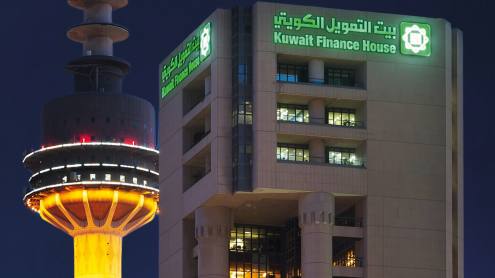Q: What will the key drivers of credit growth be in Kuwait for 2021/22?
A: Today’s low interest rate environment will remain the global backdrop for some time. In Kuwait, the discount rate hit a record low of 1.5% and we see these low interest rates as a potential catalyst for credit growth going forward.
We expect credit growth of around 4–5% in 2021, as business credit growth is likely to benefit from a rebound in economic growth and increased government spending. This will likely take place despite the expected weaker working capital financing in 2021, contrary to the trend that we increasingly witnessed over the past year due to the pandemic.
As for household credit, while lending to citizens will likely continue to be robust, given relatively secure jobs and an increasing population, lending to expats is expected to be muted [in the coming year].
Our loan book grew to $57.7bn in 2020, up by 5.7% compared to December 2019. Our conventional domestic operations in Kuwait — both retail and corporate — were among the most important contributing factors to the growth of our loan portfolio during the year. We are expecting an average growth rate in the mid-single digits for the coming 12-month period.
Going forward, we plan on staying focused on project finance. Our latest facilities included co-arranging and issuing a Kd1bn ($3.2bn) syndicated loan on behalf of [national oil company] KPC.
We expect to maintain our leadership in the local market, backed by our healthy balance sheet as well as our domestic and international relationships. Our foreign corporate unit also contributes to supporting and strengthening our well-established presence, as it provides services to around 75% of the foreign companies operating in the market, with strong dominance in letters of credit and letters of guarantee.
On the domestic front, we seek to maintain our pioneering position as the bank of choice for local large corporations and continue our efforts aimed at penetrating the medium-sized enterprise market.
Q: How have non-performing loans (NPLs) performed in the past year?
A: By all regional and international standards, we continued to maintain a very low NPL ratio, with an NPL/gross loans ratio at 1.72% in 2020. Although this is a bit higher than our levels in 2019, we have a very comfortable NPL coverage ratio of 220.0%.
I would like to clarify that the increase in NPL/gross loans ratio was due to our conservative view and proactive impairment approach in light of the growing uncertainties created by the pandemic. This has also reflected on the increased levels in provisions for credit losses that were largely precautionary in nature. It is also worth highlighting that in the second and third quarter of 2020, there was a high level of uncertainty around the operating environment and we took a very conservative view on the liquidity of some customers, which eventually led to building high provisioning buffers.
Overall, the provisions improved in the fourth quarter of 2020 [compared to the previous two quarters after the economy began to show signs of recovery]. We hope that this recovery will carry on in 2021, but at the same time the pandemic is not over yet, and its global repercussions are still unfolding. Therefore, we have cautious optimism about the future prospects of our provisions.
I would also like to point out that despite elevated levels of credit provisions and impairments, the group’s balance sheet remains strong with a stable credit quality. NBK’s capital base, along with the ability to generate healthy operating profits, provides a strong credit loss-absorption capacity.
Q: How has the coronavirus impacted NBK’s digital banking offering?
A: The payback from our digital investments was evidenced during the crisis as our digital channels played a vital role in servicing customers, with electronic transactions reaching record highs — a trend that we expect to continue even after the economic activities return to pre-pandemic levels. NBK Mobile Banking and NBK Online Banking accounted for more than 85% of banking transactions during 2020.
Customers’ dependence on mobile banking increased, as the NBK Mobile Banking app has become deservedly the bank’s largest branch and its most important digital channel. Customers are now able to electronically open bank accounts and apply for loans without having to step a foot in a branch.
The pandemic may have played a role in accelerating the pace of our digital transformation programme, but this was a future that we already anticipated and prepared for long ago. We successfully positioned ourselves to move ahead and gain a competitive edge over our competitors by maintaining a more comprehensive and sustainable digital advantage. We transformed every challenge into an opportunity to inspire future growth.
Q: What are the key next steps for the evolution of digital finance in Kuwait in the coming years?
A: Digital transformation is one of the main pillars of our long-term strategy. Today, we are poised to realise our future ambitions, thanks to setting digital initiatives at the top of our priorities, especially in retail banking.
We are tirelessly working to prepare for the next generation of fintech trends. To that end, we established our digital factory in Kuwait to support our digital transformation agenda across the entire group. The digital factory will increase our chances to engage and partner with creative and innovative talents in fintech, improve internal integration through the reconciliation of external innovation with business requirements, in a way that helps us expand our business and provide better services to enrich our customers’ experience.
I would also like to stress that we will continue to invest in digital banking services, not only on the front end, but also in our back end, such as the implementation of robotic process automation and machine learning. We also pioneered providing digital wealth management solutions through NBK SmartWealth, in partnership with our investment arm, NBK Capital. This move supports our effort to keep our young customers engaged and allow us to further support their investment journey. Moreover, we continue to develop solutions for fast cross-border money transfer solutions using blockchain technology.
Our newly launched data centre is always put to good use to enhance our analytics in designing and adopting the best offers and services, reduce costs and minimise risks. Additionally, we continue to improve the NBK Mobile Banking app and integrate our branches with electronic channels to enrich customer experience.
Kuwait is actively working to be at the forefront of digitisation and help promote technological innovation. About 70% of the 15–24 year age group have bank accounts, compared to a global average of 54%. This segment represents the target market for technologically advanced products and services due to their eagerness and preparedness to experiment with new financial offers. They are also constantly looking for more convenient and comfortable ways to bank.
Generally, I see that banks need flexibility to deal with both unexpected challenges and opportunities, in addition to correcting their course during their digital transformation journey. To reach this goal, banks need a flexible and simplified IT infrastructure based on a data platform, in essence to transform into digital enablers. This platform should be scalable with a modern infrastructure to store and process all types of data. I would like to emphasise that technology will not fully replace human capabilities, but rather will enhance and refine our analytical capabilities.













